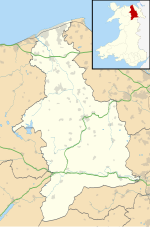St Meugan's Church was the original parish church of Ruthin, in Denbighshire, Wales. Located about 1.5 km east of the centre of the town, the church is dedicated to Saint Meugan, a Welsh saint of the 5th/6th centuries. Although with earlier origins, the present church dates to the 13th century, with additions and enlargements in the following two centuries. St Meugan's was later superseded as the parish church of the town by the more centrally-located St Peter's Church. It remains an active church in the Diocese of St Asaph and is a Grade I listed building.
| St Meugan's Church, Llanrhydd | |
|---|---|
 | |
| 53°06′36″N 3°17′10″W / 53.1101°N 3.2862°W | |
| OS grid reference | SJ 140 577 |
| Location | Llanrhydd, Ruthin, Denbighshire |
| Country | Wales |
| Denomination | Church in Wales |
| History | |
| Dedication | Saint Mawgan |
| Associated people | Reverend J S Evans (Priest in charge) |
| Architecture | |
| Functional status | Active |
| Heritage designation | Grade I |
| Designated | 24 October 1950 |
| Architectural type | Church |
| Groundbreaking | 13th century with later additions |
| Specifications | |
| Materials | Body of church: rubble Roof: slate |
| Administration | |
| Diocese | St Asaph |
| Archdeaconry | St Asaph |
| Deanery | Dyffryn Clwyd |
| Parish | Mission Area of Dyffryn Clwyd |
History
editThe Church of St Meugan stands about a mile east of the town of Ruthin.[1] It is dedicated to Saint Meugan, a Welsh saint of the 5th or 6th centuries. Cadw suggests that the dedication references the site of a 6th-century llan settlement.[2] It was damaged during the Conquest of Wales by Edward I and compensation was paid by the king's commissioners.[3] The roof and rood screen date from the 15th century.[4] The church was restored by Henry Kennedy, Diocesan Architect to the See of Bangor, in 1852.[5]
St Meugan's was replaced as the town's parish church by the more centrally-located St Peter's Church. It remains an active parish church in the Diocese of St Asaph and occasional services are held.[6]
Architecture
editSt Meugan's is a single-chamber church, the nave and chancel combined, with a south porch and a bellcote.[1] The building materials are limestone and sandstone with a Welsh slate roof.[3] The architectural historian Edward Hubbard, in his 2003 Clwyd volume of the Pevsner Buildings of Wales, notes the impressive collection of funerary monuments dating from the 16th to the 19th centuries.[a][5] The Royal Commission on the Ancient and Historical Monuments of Wales (RCAHMW) records the "fine" seven-bay collar truss roof[4]
St Meugan's is a Grade I listed building.[2] A shaft, all that remains of its 15th century churchyard cross, is listed at Grade II*,[7] and a monument in the churchyard is listed at Grade II.[8]
Gallery
edit-
The interior
-
The "fine" collar truss roof
-
Monument in the church
-
Shaft of the churchyard cross
Notes
editReferences
edit- ^ a b "Historic Settlement Survey:Llanrhudd (Llanrhydd)" (PDF). Clwyd-Powys Archaeological Trust. Retrieved 11 September 2024.
- ^ a b c Cadw. "Church of St Meugan (Grade I) (739)". National Historic Assets of Wales. Retrieved 11 September 2024.
- ^ a b "Church Heritage Record 1141: St Meugan, Llanrhydd". Church in Wales. Retrieved 11 September 2024.
- ^ a b "St Meugan's Church, Llanrhydd (163386)". Coflein. RCAHMW. Retrieved 11 September 2024.
- ^ a b Hubbard 2003, p. 233.
- ^ "St Meugan, Llanrhyd". Church in Wales. Retrieved 11 September 2024.
- ^ Cadw. "Churchyard Cross Shaft at St Meugan's Church (Grade II*) (21925)". National Historic Assets of Wales. Retrieved 11 September 2024.
- ^ Cadw. "Chest Tomb at St Meugan's Church (Grade II) (21926)". National Historic Assets of Wales. Retrieved 6 September 2024.
Sources
edit- Hubbard, Edward (2003). Clwyd (Denbighshire and Flintshire). The Buildings of Wales. New Haven and London: Yale University Press. ISBN 978-0-300-09627-9. OCLC 315792534.
External links
edit- Media related to St Meugan's Church, Llanrhydd at Wikimedia Commons
